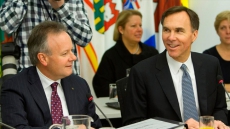VANCOUVER — Bank of Canada governor Stephen Poloz says risks from household debt and the housing market will be better addressed by the government's recent policy moves than by adjusting interest rates.
In a speech in Vancouver, the head of Canada's central bank says adjusting interest rates is a "very blunt tool" that has widespread effects.
"Our view is that these so-called macroprudential policies are best placed to deal with threats to financial stability because they can be designed to target specific financial vulnerabilities," Poloz said, according to a text of his speech released in Ottawa.
"Given all the work done to strengthen the global financial system over the past few years, it makes even more sense to separate monetary policy from efforts to stabilize the financial system."
Household debt levels have hit record levels in recent years and housing markets have boomed, helped by low interest rates that have allowed consumers to borrow cheaply.
Finance Minister Bill Morneau said last month that he's "ultimately responsible" for maintaining the stability of the country's financial system.
Ottawa announced several policy changes in October aimed at reducing risk related to the housing market and household debt, including new rules requiring all insured mortgages to undergo stress tests to make sure borrowers will still be able to make their payments if interest rates go up.
The moves followed changes last year that increased the minimum down payment on the portion of a home worth more than $500,000.
Poloz said the bank does not ignore financial stability issues but suggested it has flexibility to deal with uncertainty.

"We acknowledge that there is always uncertainty around the outlook for inflation, and developments in the financial system bring uncertainties for financial stability," he said.
"These uncertainties generate a zone within which we can tolerate variations in either the risks to our inflation outlook or risks to financial stability."
The Bank of Canada uses its the inflation target when determining monetary policy and setting its key overnight interest rate.
The central bank and the federal government renewed their inflation-targeting framework agreement last week. The target was kept at two per cent — the midpoint of a range of one per cent to three per cent that the central bank deems acceptable.
However, the Bank of Canada said it will change the way it measures core inflation which it uses to help focus on the underlying trend in inflation. It will use three different ways to measure instead of a single method of assessing core inflation.
Poloz noted that because the inflation-targeting framework is an agreement between the federal government and the central bank there is an explicit commitment from the government to support its pursuit of low, stable and predictable inflation.
"The agreement therefore means that all economic policies — including monetary, fiscal and macroprudential — can work together in a complementary fashion," he said.
Poloz said the central bank's use of a inflation target has served the economy well, but it continues to look for ways to improve.
"We will be looking for new ways to engage with Canadians in a discussion about our framework," he said.
Canada started using an inflation target to guide monetary policy in 1991 and has kept the target set at two per cent since 1995.




